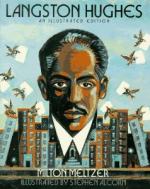|
This section contains 1,070 words (approx. 4 pages at 300 words per page) |

|
In his poem, "Children's Rhymes," Langston Hughes offers a brief but rewarding glimpse of Black children at play on city streets, complete with jingles that have been improvised out of the Black experience to replace more innocent ditties:
What's written down
for white folks
ain't for us a-tall:
"Liberty and Justice—
Huh—For all."
The contrast which Hughes offers here is familiar enough: it is the well known contradiction between the American promise of "liberty and justice," on the one hand, and on the other hand, the political and socio-economic disadvantages of the Black American. But, looked at more closely, Hughes' poem is interlaced with additional ironies…. [The] ironic ambiguity of Hughes' poem implies that if Blacks have been excluded outright from the American Dream, White Americans have also denied themselves the substance of those libertarian ideals that have been enshrined in the sacred rhetoric, and history, of...
|
This section contains 1,070 words (approx. 4 pages at 300 words per page) |

|


